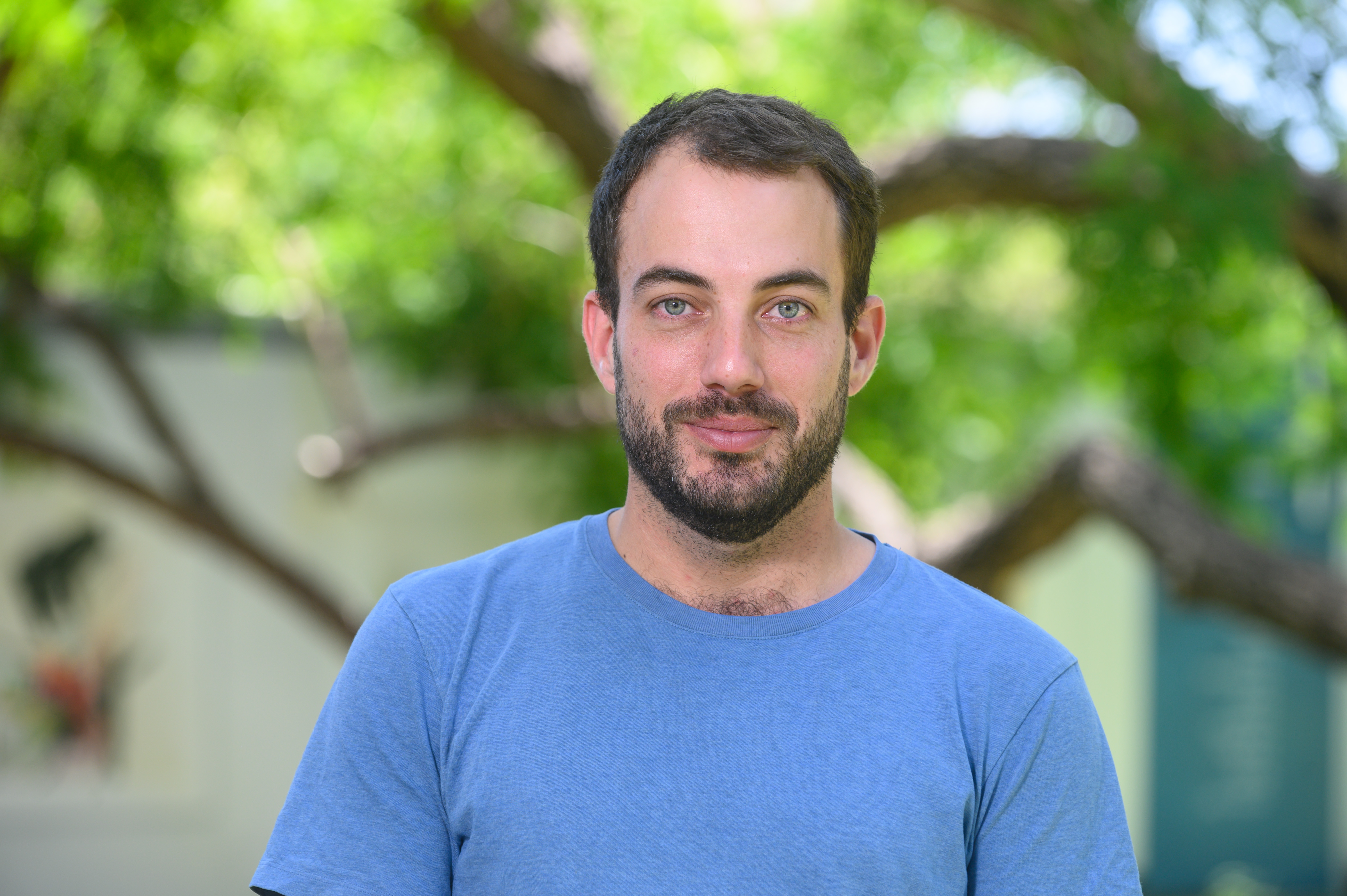הכירו את איתמר קרבי, סטודנט לדוקטורט בקבוצתו של ד"ר רעי צ'מקה
Date: June 20, 2023
איתמר חוקר את שינויי האקלים בקווי הרוחב הבינוניים במסגרת לימודי הדוקטורט שלו אצל ד"ר רעי צ'מקה. היעד שלו הוא לענות על הצורך הדחוף להבין איך האקלים משתנה ולנסות לפתור את הבעיה הזו, שהופכת חמורה ודחופה מרגע לרגע
Itamar's doctoral research, under the supervision of Dr. Rei Chemke, focuses on climate change in the mid-latitudes. His goal is to address the urgent need to understand how climate is changing and to try to solve this pressing issue, which is becoming increasingly severe

איתמר חוקר את שינויי האקלים בקווי הרוחב הבינוניים (30-60 מעלות), בהם מתגורר אחוז משמעותי מאוכלוסיית העולם. בקווי רוחב אלה הזרימה נשלטת ע"י גלים באטמוספירה. בקבוצתו חוקרים את הstorm tracks לחופי האוקיינוס האטלנטי והפסיפי והשפעתם על מערכות מזג האויר.
"אנחנו משתמשים בכך שלגלים יש תפקיד משמעותי בקווי הרוחב הבינוניים כדי לנסות לנתח כיצד ישתנו סקאלות הגודל והזמן של תופעות אקלימיות כחלק משינויי אקלים -לכך יש השפעה על יכולת ההסתגלות שלנו לשינויי האקלים. להתכונן לסופה גדולה שונה מהתכוננות לסופה קטנה יותר, כך גם התתכוננות לגל חום ארוך לעומת קצר. אנחנו מנסים לאפיין את השינויים ובד בבד להבין את מקורם. באירופה וקליפורניה מזג האויר מתאפיין בגלים של סופה, הפסקה, סופה, הפסקה וכו. אצלינו מרגישים את זה בעיקר בחורף אך לא בקיץ."
מה אתה מרגיש שהביא אותך לחקר כדה"א?
עשיתי תואר ראשון בפיסיקה עם חטיבה במדעי כדה"א באוניברסיטה העברית. המשכתי לתואר שני בפיסיקה במכון ויצמן. מה שעניין אותי אצל רעי זה שהוא חוקר אקלים ושינויי אקלים. בייחוד סיקרנה אותי השאלה כיצד הכלים שרכשתי בפיסיקה יכולים לשמש לחקר העולם שאנו חיים בו ואיך שהוא משתנה והחיבור לבעיית שינוי האקלים, שיש בה דחיפות.
מה אתה עושה בחיים כשאתה לא במעבדה?
אני מאד אוהב טיולים ברגל גם בארץ וגם בחו"ל. אני שוחה, רץ ואוהב ספורט - זה עוזר גם למחקר וגם בכללי. אני אוהב גם לקרוא הרבה ספרות.
מה השאיפות שלך לעתיד?
אני בתחילת הדוקטורט אבל ברור לי שארצה להשתמש בגישה שאני מפתח כעת למחקר במדעים מדוייקים וספציפית במדעי האקלים ושינויי אקלים כדי להמשיך במסגרת קריירה אקדמית או, לחילופין, לעבוד מחוץ לאקדמיה במקום בו אוכל לנצל את הכישורים שרכשתי כאן. ההזדמנויות לכך נהיו רבות כי נושא שינוי האקלים נהיה חשוב ודחוף, לצערנו. הצורך להבין איך האקלים משתנה הוא חשוב. אשמח להשקיע את העבודה הקשה במחקר במדעים כדי להיות חלק מאלו המנסים להבין את הבעיה וכיצד לפתור אותה.
מסר ממך לסטודנטים שבאים למחלקה.
המחלקה היא מקום עם הרבה אנשים טובים ודרך הסתכלות מאד מגוונת על כדה"א. למדתי במחלקה להשתמש במדעים כדי להבין את הטבע ולהצליח להבין דברים שהייתי סקרן לגביהם או, לחילופין, כאלו שמעולם לא חשבתי עליהם בעבר.
Itamar studies climate change in the mid-latitudes (30-60 degrees), where a significant percentage of the world's population resides. In these latitudes, atmospheric circulation is influenced by atmospheric waves. His research focuses on the storm tracks along the Atlantic and Pacific Ocean coasts and their impact on weather systems.
"We use the fact that atmospheric waves play a significant role in the mid-latitudes to analyze how climate phenomena's scales (i.e., size and time) will change due to climate change. This affects our ability to adapt to climate change. Preparing for a major storm differs from preparing for a smaller one, just as preparing for a long heatwave differs from preparing for a short one. We are trying to characterize these changes and understand their origins. In Europe and California, the weather is characterized by a pattern of a storm, a break, another storm, another break, and so on. Here in Israel, we feel it mainly in the winter, but not in the summer."
What led you to research climatology?
I earned a bachelor's degree in physics with a focus on atmospheric sciences at the Hebrew University. I continued to pursue a master's degree in physics at the Weizmann Institute. What interested me in climate research, especially, was how the tools I acquired in physics can be used to study the world we live in and how it's changing, particularly with respect to climate change, which is an urgent matter.
What are your interests outside the lab?
I love hiking both in Israel and abroad. I swim, run, and enjoy sports, which not only helps with research but also in general. I also love reading.
What are your aspirations for the future?
I am at the beginning of my Ph.D., but it's clear to me that I want to use the approach I am developing now for scientific research, specifically in climate science and climate change, either as part of an academic career or, alternatively, working outside academia where I can utilize the skills I've acquired here. There are many opportunities because, unfortunately, climate change has become an important and urgent issue. Understanding how our climate is changing is crucial. I would be happy to put in the hard work in scientific research to try and understand this problem and how to solve it.
What would be your message to students coming to our department?
The EPS is a place with many talented people and offers a very diverse perspective on Earth sciences. I learned how to use science to understand nature and to comprehend things I was curious about or had never thought about before.
